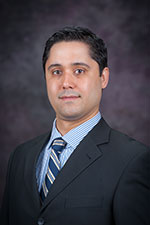Yucel, Umut

Associate Professor
207 Call Hall
785-532-1208
yucel@ksu.edu
Area(s) of Specialization
Chemistry and physical chemistry of foods
Advanced food materials characterization techniques
Food emulsions and colloids; food lipids
Design and development of novel encapsulation systems for bioactive food components
Functional foods
Education
B.S. Food Engineering, Middle East Technical University, Turkey, 2004
M.S. Food Engineering, Middle East Technical University, Turkey, 2006
M.S. Food Science, Pennsylvania State University, 2010
Ph.D. Food Science, Pennsylvania State University, 2011
Bio Brief
Dr. Umut Yucel was born and raised in Ankara, the capital of Turkey. His diverse research portfolio stems from his professional and educational background in food engineering, food biophysical chemistry, and analytical chemistry. He earned B.S. (2004) and M.S. (2006) degrees in Food Engineering from the Middle East Technical University (METU), Turkey, and M.S. (2010) and Ph.D.(2011) degrees in Food Science from the Pennsylvania State University. He continued his academic training as a Post-Doctoral Researcher at the Flavor Research and Education Center, University of Minnesota. In April 2014, he became an Assistant Professor of Food Engineering at METU. He joined the Department of Animal Sciences and Industry and the Food Science Institute at Kansas State University in March 2016 with research and teaching responsibilities.
Dr. Yucel is a food science scholar with areas of expertise in ingredient functionality for innovative food products, colloidal dispersions, soft materials and hydrogels, delivery and encapsulation of functional ingredients (e.g., antioxidants, antimicrobials, flavors, and probiotics), oleochemicals, free radical mechanisms, lipid oxidation, processomics and flavoromics in fermented products, and sustainable packaging films and coatings. His current research interests also generate knowledge for understanding the prevalence of emerging toxicants, such as microplastics and PFAS, in food products and agricultural resources (e.g., surface water, groundwater, soil), elucidate their mobility through the food supply chain, and develop mitigation strategies. In parallel with his research, his teaching portfolio includes a variety of undergraduate and graduate courses with in-person and online modalities, including Flavor Chemistry, Food Dispersions, Fermented Foods, Physical Methods in Food Analysis, and Quality Assurance of Food Products. Throughout his appointment, he has led researchers from various units at the College of Engineering, Agriculture, and Arts and Sciences to secure research funding from grantors, such as USDA, Kansas Department of Agriculture, NIH, and various commodity boards. He enjoys collaborating with private sector companies to validate technologies and provide technical expertise in solving problems related to product development, processing, food quality, and material characterization.